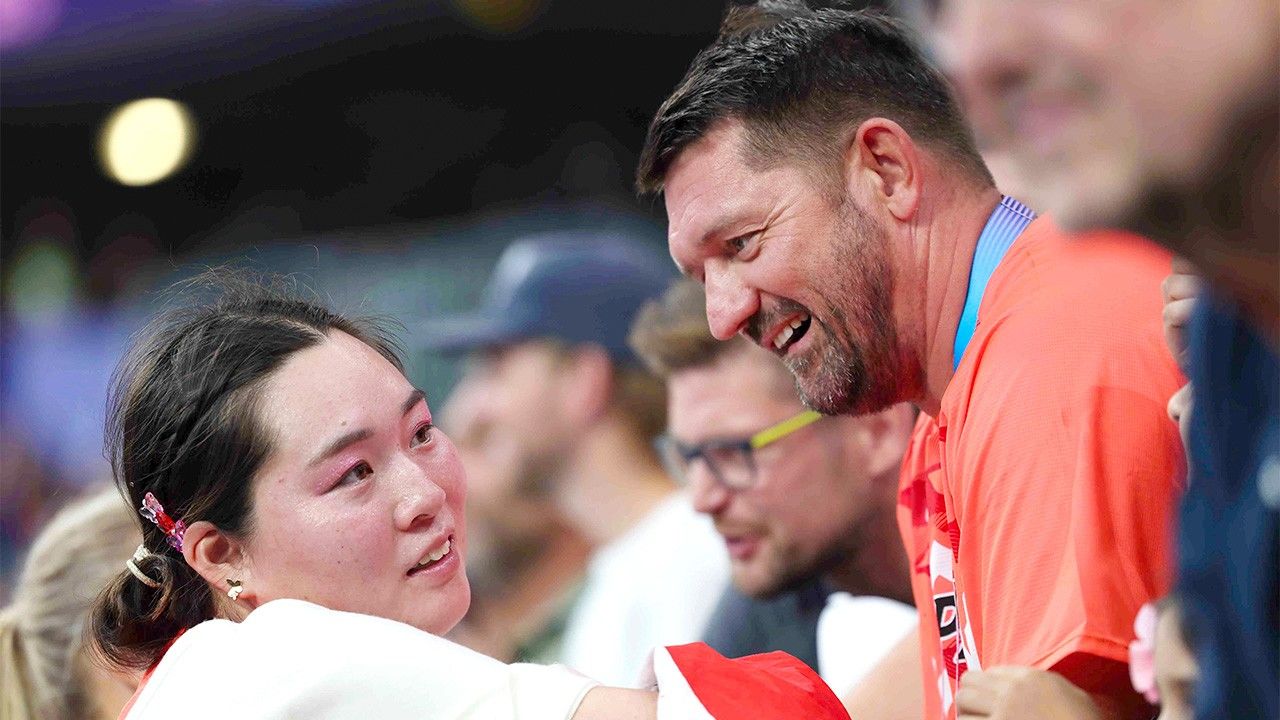
Triumphs and Looming Concerns: Decoding Japan’s Medal Count in Paris
Sports- English
- 日本語
- 简体字
- 繁體字
- Français
- Español
- العربية
- Русский
Widening Medal Range
Japan made a strong showing at the Summer Games in Paris, finishing third in the medal table behind the United States and China. Its haul of 45 medals included 20 gold, 12 silver, and 13 bronze, the second most after the Tokyo Olympics held in 2021. That the medals were spread across 16 different events illustrates the scope of athletic participation in Japan.
Japanese Gold Medals at Recent Summer Olympics
| Paris (2024) |
|---|
| Medals: 20 Medal table: third |
| Wrestling 8, jūdō 3, gymnastics 3, skateboarding 2, fencing 2, breaking 1, athletics 1 |
| Tokyo (2021) |
|---|
| Medals: 27 Medal table: third |
| Jūdō 9, wrestling 5, skateboarding 3, gymnastics 2, swimming 2, table tennis 1, karate 1, boxing 1, fencing 1, baseball 1, softball 1 |
| Rio de Janeiro (2016) |
|---|
| Medals: 12 Medal table: sixth |
| Wrestling 4, jūdō 3, swimming 2, gymnastics 2, badminton 1 |
| London (2012) |
|---|
| Medals: 7 Medal table: eleventh |
| Wrestling 4, jūdō 1, gymnastics 1, boxing 1 |
Notes: Medal table ranking is by country. Created by Nippon.com based on data from Ministry of Education, Culture, Sports, Science, and Technology.
Notable among the gold medalists was javelin thrower Kitaguchi Haruka, whose mark of 65.80 meters made her the first Japanese female athlete to win an athletics event other than the marathon.
Born in 1998, the Hokkaidō Prefecture native excelled at sports from a young age, competing in national competitions in badminton and swimming as an elementary school student. She picked up the javelin partway through high school and quickly demonstrated a natural talent for the event, winning back-to-back golds at Japan’s Inter–High School Championship.
She poured herself into the event after joining Nihon University in 2016, working continuously to improve her form. While competing in Europe in 2019, she met David Sekerak, the coach of the Czech Republic’s national junior javelin team. She was intrigued by his approach to the javelin, and through a series of e-mails laboriously typed out in English, she convinced Sekerak to coach her. Kitaguchi’s persistence in wooing Sekerak—behavior some might characterize as being atypical for a Japanese person—paid off in spades by propelling her to become an Olympic champion.
Speaking about her decision to take Sekerak as her coach and make the Czech Republic her base, Kitaguchi, who has learned to speak Czech, said, “I wanted to train at the highest level. As a javelin powerhouse, Czech has specific terminology reflecting ideas and techniques about the event that just don’t exist in Japan.”
Gauging the Impact of Foreign-Born Coaches
Coaching also made an impact on the Japanese men’s volleyball team, who drew attention as a medal contender in the run up to Paris. Since taking over as head coach in 2017, French-born Philippe Blain trained the team with a strategy that took full advantage of data analytics to build up his players and fine-tune lineups to counter the strengths and exploit the weaknesses of opponents. He succeeded in turning Japan from a minnow on the international stage into a force to be reckoned with.
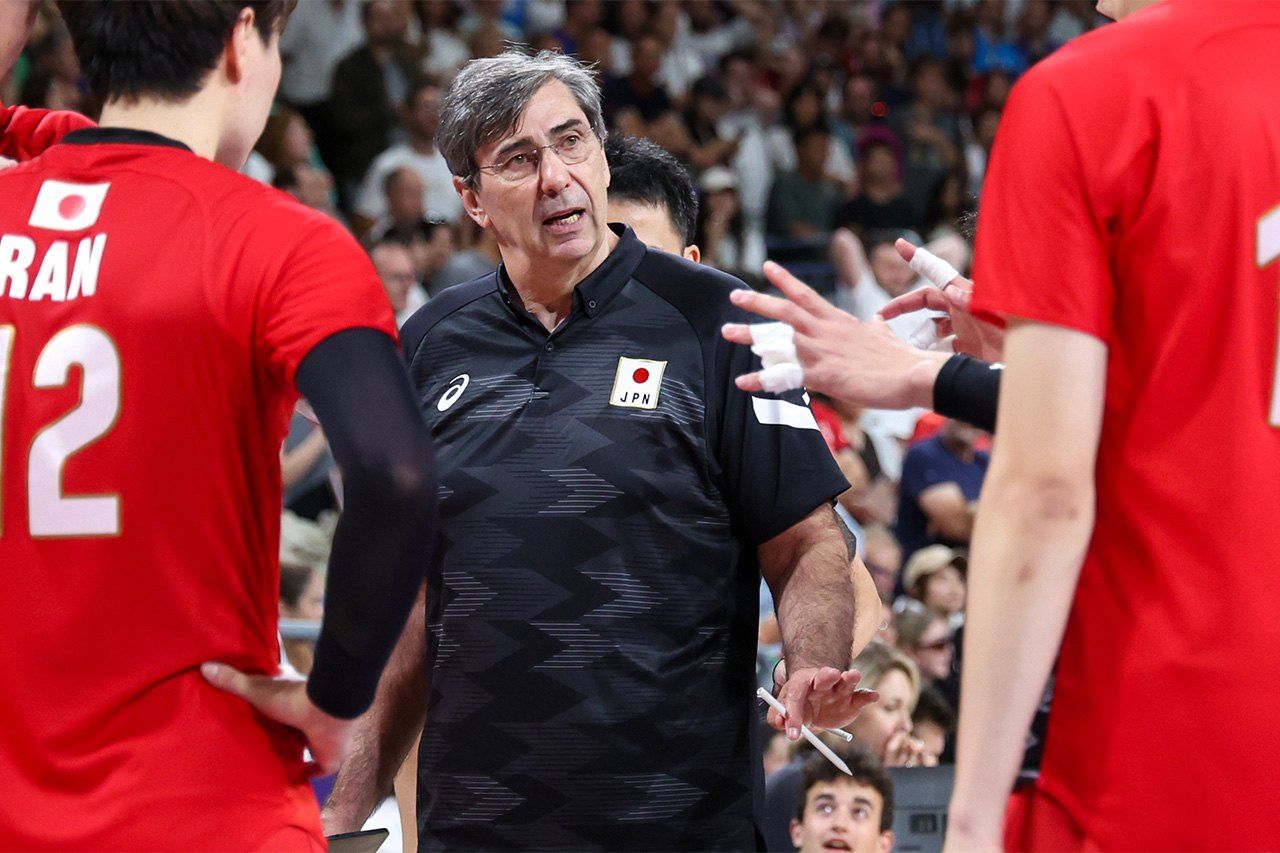
Japanese men’s national team coach Philippe Blain instructs his players during Japan’s quarterfinal match against Italy on August 5, 2024, in Paris, France. The match ended in a heartbreaking full-sets loss for Japan. (© Jiji)
Blain had his doubts about coaching Japan. Speaking shortly after accepting the post, he said that he interviewed all his players and expressed to each individually how he wanted them to play. “Everyone gave a firm ‘yes,’ but then went on playing as they always did. I thought maybe something had got lost in translation. By the third round of meetings, I told players to repeat in their own words what I had told them. I had a good chuckle at the looks of surprise that I got. It opened my eyes to the fact that Japanese players will say ‘yes’ to the coach even when they mean ‘no.’ It was a great learning experience.”
As communication between Blain and his players improved, so did Japan’s performance. At the Tokyo Games, the squad battled its way into the quarterfinals, its first appearance since 1976, demonstrating its embrace of Blain’s approach to volleyball. Blain certainly benefitted from the presence of top talent like Ishikawa Yūki and Takahashi Ran, but it was his vision that lifted the team as a whole.
Another event where Japan looked to a foreign-born coach to raise its medal chances was fencing. In 2021, the team tapped French fencer Erwann Le Péchoux, who was part of France’s team foil gold in Tokyo, as coach. Taking the reins, he went to work on Japan’s weaknesses, describing the team as “talented but unconfident.” One issue was getting team members to practice effectively—a conundrum shared by more sports than just fencing. “They train long and hard,” Le Péchoux commented, “but have little to show for it.” Addressing these and other points, he led Japan to a historic gold in the men’s team foil event.
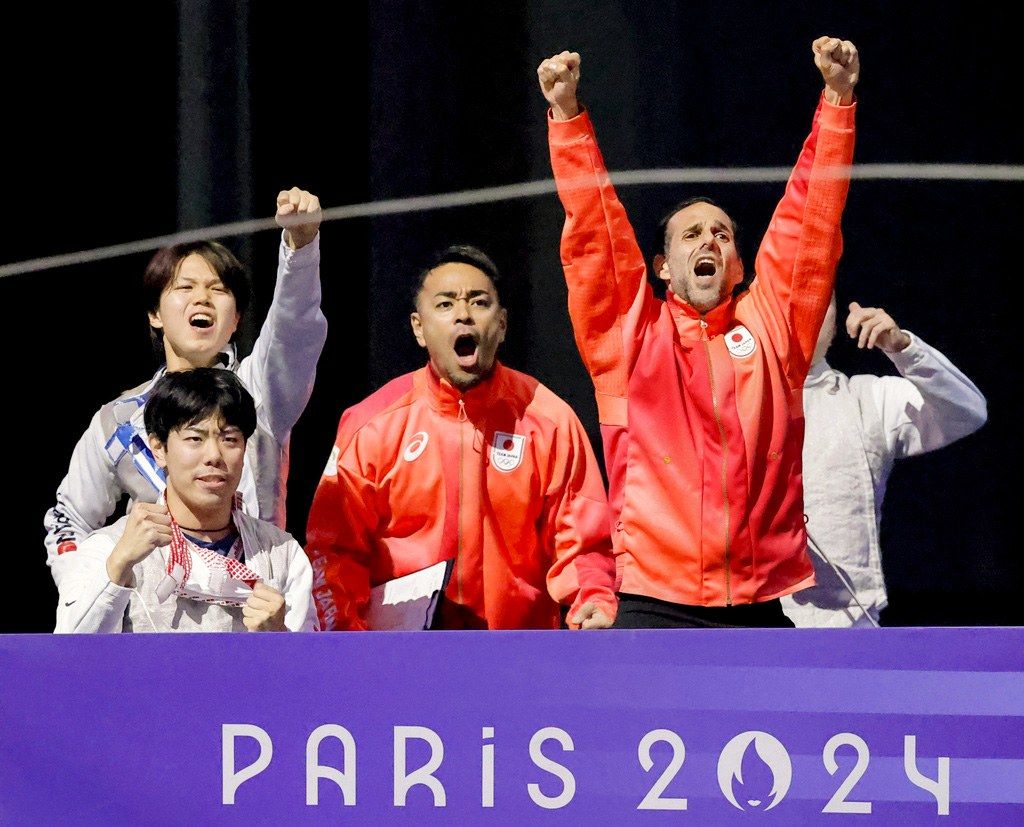
Erwann Le Péchoux (right) raises his arms in celebration at Japan’s dramatic win in the final of the men’s team foil on August 5, 2024, in Paris, France. (© Kyōdō)
Standing Reputation
While foreign-born coaches drew attention for helping Japanese athletes capture medals in what are considered minor sports in Japan, their Japanese counterparts were behind strong showings in gymnastics, jūdō, and wrestling, events in which Japan has long had an international presence.
At the 1964 Tokyo Games, Japan captured five gold medals in both gymnastics and wrestling and dominated the jūdō competition, winning three of the four weight classes. Six decades later in Paris it was still among the leading countries in the events, claiming eight golds in wrestling and three each in gymnastics and jūdō.
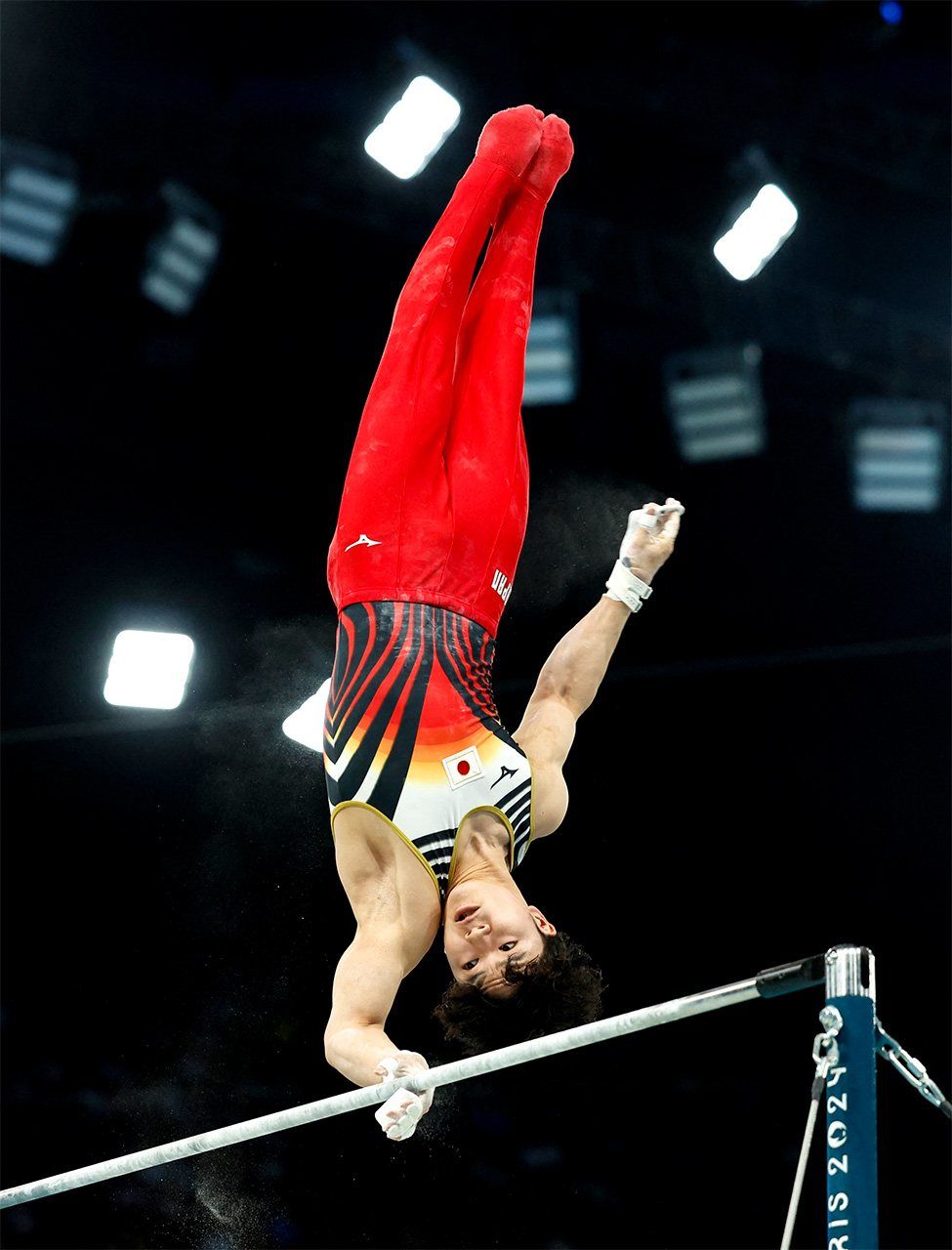
Oka Shinnosuke performs on the horizonal bar during the men’s artistic individual all-around on July 31, 2024. He won the event and also took home gold in the team all-around and horizontal bar, along with bronze in the parallel bars. (© Reuters)
Japan has long been known for producing gymnasts who excel in the all-around, contrasting with the focus on producing specialists in individual events stressed by many other countries. Japan has maintained a straightforward training strategy: Mastering something like the rings or pommel horse requires a specific set of skills, whereas being competitive in all six gymnastic events calls for well-rounded strength and abilities. Unsurprisingly, Japan’s pursuit of all-around perfection has propelled it to gold in the men’s event at four straight Olympics—Uchimura Kōhei in London and Rio, Hashimoto Daiki in Tokyo, and Oka in Paris.
In jūdō, Japan earned three gold medals in Paris, far short of its nine in Tokyo but still a performance it can be proud of. As jūdō has developed as a competitive sport, it has necessarily diverged from the original martial art in significant ways as techniques and strategies for defeating an opponent have evolved. For its part, Japan has staunchly stressed the importance of form, etiquette, and the beauty of the martial art over a focus on merely winning.
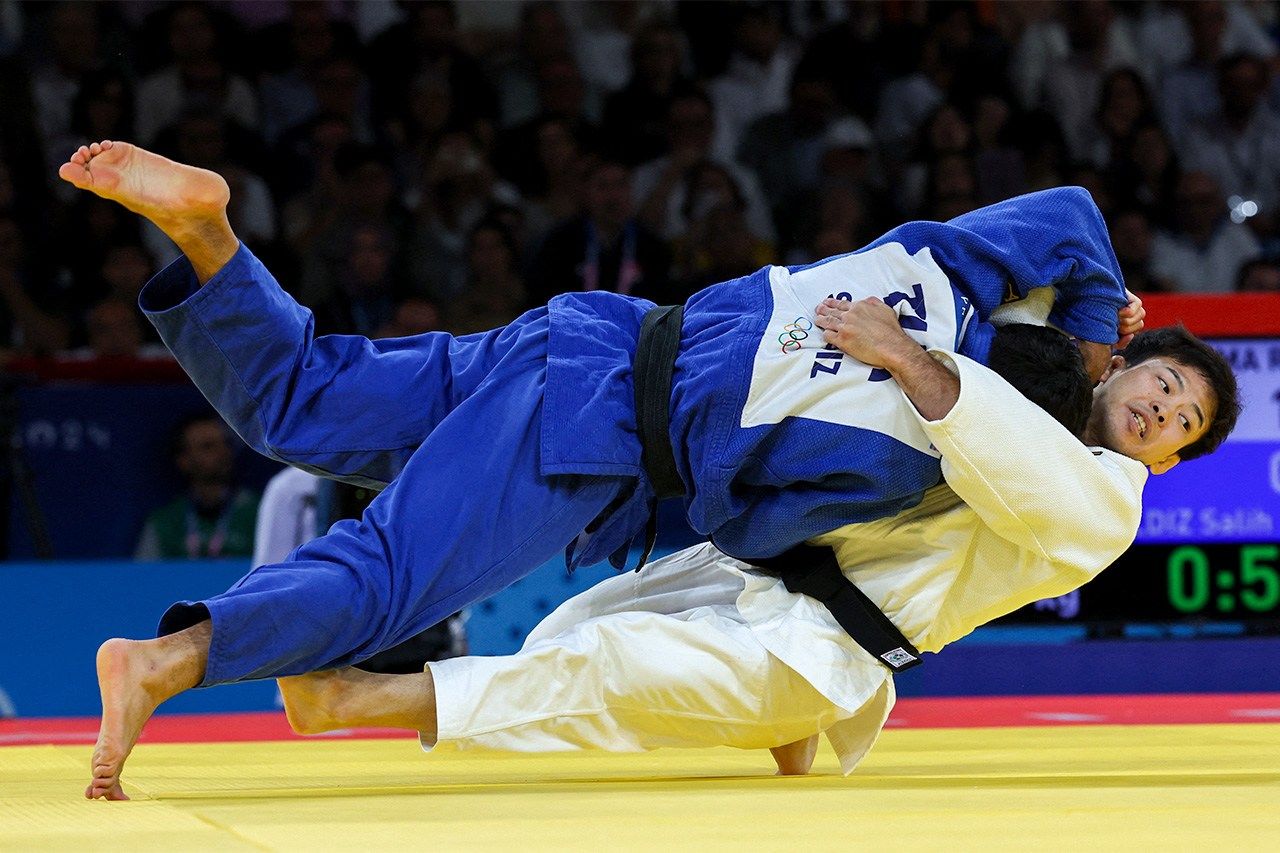
Nagayama Ryūju throws Salih Yildiz of Turkey in the third-place match of the men’s 60 kg event on July 27, 2024, in Paris, France. Nagayama bounced back from a controversial decision in the quarterfinal to win bronze. (© Reuters)
Wrestling is another event where Japan has remained a powerhouse. Japanese wrestlers have traditionally excelled in freestyle, but Paris saw Fumita Ken’ichirō and Kusaka Nao capture gold in the Greco-Roman style. Two-time Olympic medalist Akaishi Kōsei, director of performance enhancement for the Japanese national team, lauds the hard work of the two wrestlers. “The level of training for freestyle is very high in Japan,” he explains. “With Greco-Roman, though, the wrestlers chose to train overseas, and their medals speak to the success of this strategy.”
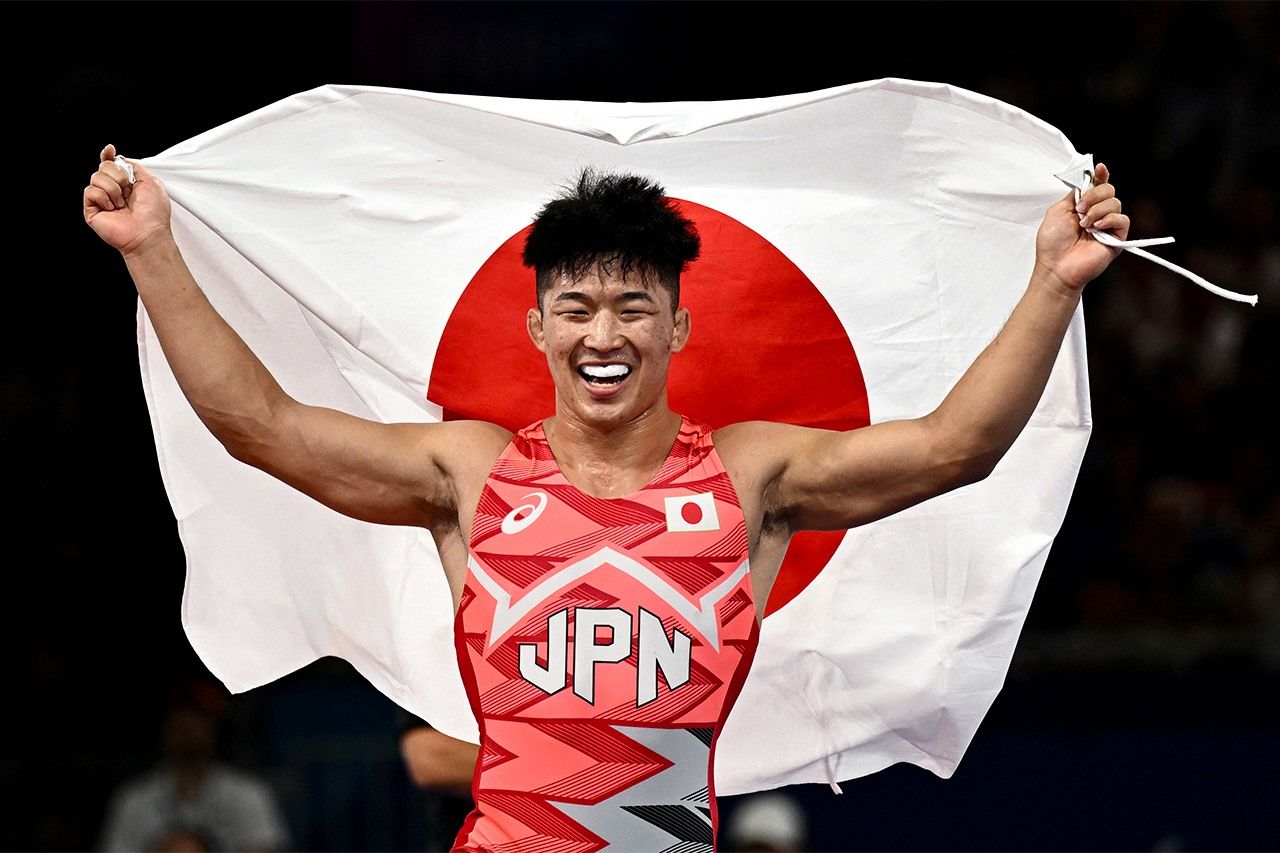
Kusaka Nao brandishes the Japanese flag after winning the gold medal in the Greco-Roman wrestling 77 kg division on August 7, 2024, in Paris, France. It was Japan’s first gold in the higher weight classes of wrestling. (© Jiji)
Dwindling Participation
While Japan remains at the fore of gymnastics, jūdō, and wrestling, a troubling trend at the junior level hints at a looming crisis. Youth participation has been steadily falling in the three events, as illustrated by the lower number of male senior high school students involved in extracurricular clubs in 2023 compared to 2013, as shown in the table below.
Gymnastics
- 2013: 2,455 students
- 2023: 1,689 students
Jūdō
- 2013: 18,719 students
- 2023: 10,825 students
Wrestling
- 2013: 2,343 students
- 2023: 1,722 students
Compared to an average drop of some 10% over the last decade for all sports, amid Japan’s broader demographic trend of population decline, the already small population of participants in gymnastics and wrestling fell by around 30%, while jūdō suffered a drop of over 40%. Such rates raise concerns about Japan’s ability to field top athletes who can compete on the world stage.
Oka and his three gymnastic gold medals stand as a potential model going forward. Seeking a better training environment, Oka dropped out of high school at age 15 and joined the powerhouse Tokushūkai Gymnastics Club, attending an online school while he trained. His results speak for themselves. Even as participation in sports dwindles, if gifted athletes dedicate themselves completely to honing their talents, we may see more cases like Oka’s going ahead.
Another avenue for bringing up elite athletes among the dearth of participation is for successful athletes to “keep it in the family” by encouraging their offspring to follow in their footsteps. There were several second-generation athletes who participated in Paris. Jūdō heavyweight Saitō Tatsuru carried the mantle of his legendary father Hitoshi, who won back-to-back golds in the heavyweight class in Los Angeles (1984) and Seoul (1988). The gold medalist in the women’s 62 kg freestyle wrestling, Motoki Sakura, was influenced to join the sport by her father Yasutoshi, a Greco-Roman style wrestler and member of the Olympic squad that competed in Sydney in 2000.
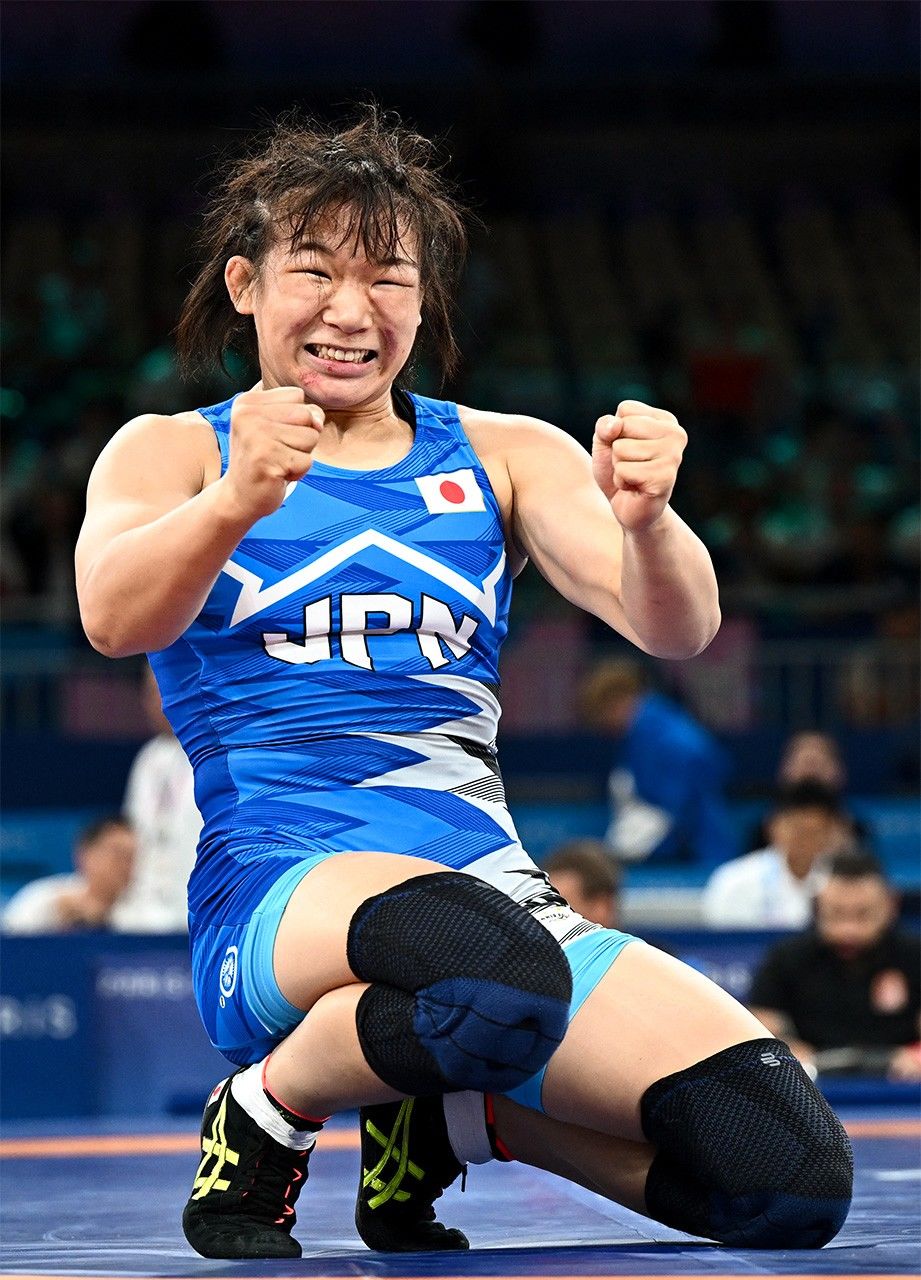
First time Olympian Motoki Sakura celebrates her freestyle wrestling gold in the women’s 62 kg division on August 10, 2024, in Paris, France. (© Reuters)
Japan faces a slew of challenges in maintaining its reputation as a medal contender in a wide array of Olympic events. But with a dedicated strategy, including providing junior athletes with rich training environments and tapping into foreign-born coaching talent, it can continue the success it enjoyed in Paris for many generations to come.
(Originally published in Japanese. Banner photo: Kitaguchi Haruka, at left, celebrates her historic gold in the women’s javelin with coach David Sekerak on August 10, 2024, in Saint-Denis, France. © Jiji.)
